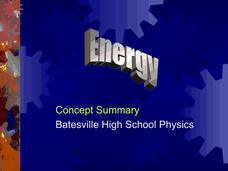Texas State Energy Conservation Office
Investigation: Conservation of Energy
By rolling marbles down a six-foot length of track, physical scientists determine how much energy is lost to heat. It is recommended that you opt for the foam pipe insulation track because more friction slows the marble, allowing...
Batesville Community School Corporation
Energy in a Nutshell
Reduce the work it takes to plan a physics lesson on energy with the help of this instructional presentation. Beginning with clear explanations of kinetic and potential energy, this resource continues on to familiarize young scientists...
Mr. E. Science
Energy and Power
Teens often display potential energy in class and kinetic in the hallways. This third presentation covers the six types of energy, each in potential and kinetic form. It also covers the Law of Conservation of Energy and Einstein's Theory...
University of California
Work, Energy, Power, Momentum
Planning a physics unit on energy can take a lot of work, luckily this instructional presentation is here to help. Covering everything from work and energy to elastic collisions and the conservation of momentum, this comprehensive...
Teach Engineering
Household Energy Conservation and Efficiency
Are your household devices eating up a lot of energy? Pupils investigate household energy efficiency through a set of activities. They find ways to improve energy efficiency and reduce consumption. This is the 21st installment of a...
LABScI
Potential and Kinetic Energy: The Roller Coaster Lab
Ron Toomer, a famous roller coaster designer, suffered from motion sickness. Pupils design their own roller coasters, learning about potential and kinetic energy in the process. Labs focus on the importance of drop height, energy...
Indiana Department of Education
Amusement of the Future
Take your class on the ride of their lives! Physical science scholars get an in-depth look at potential and kinetic energies in an amusement park-themed unit. Students research, design, and promote their own amusement parks, complete...
Kenan Fellows
Engineering Skills Through Problem Based Learning
Navigate the ups and downs of learning about energy. Future engineers consider how potential and kinetic energy apply to roller coasters. They design a roller coaster of their own and then use computer design software to showcase their...
Bonneville
Solar Pathfinder Tutorial
Find the right path to learn about solar energy. Scholars set up and use Solar Pathfinders to take measurements related to solar insolation at a particular site. Based on the data, they estimate the solar potential in kWh/m^2/day of a...
Kenan Fellows
How Much Heat Can a Phase Change Produce?
Scholars learn about heat release in phase changes. They perform calculations as they compare and contrast a science fiction passage and a home heating application.
LABScI
Kinematics: The Gravity Lab
Falling objects can be brutal if you don't protect your noodle! Scholars explore the motion of falling objects through measuring short intervals to determine if the distance traveled varies with time. Building off of this, scholars...
Bowels Physics
Electric Circuits
Investigate the construction of the electric circuit with a thorough presentation that provides a solid background for each type of circuit. After introducing key vocabulary, the lesson goes on to explain circuit design.
National Institute of Open Schooling
Electrochemistry
In an electrolytic cell, electrical energy is converted into chemical energy, the exact opposite of a battery! Lesson 15 in a series of 36 explores electrochemistry. Participants begin by reading and discussing oxidation/reduction...














